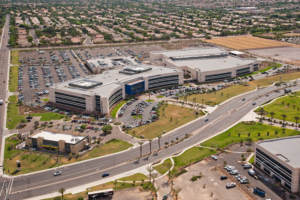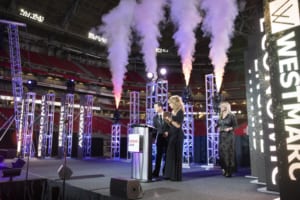BOMA Greater Phoenix hammers home a trio of initiatives: advocacy, smart sustainability, better management practices
It’s still a jungle out there.
Commercial vacancy rates remain high, industry figures show, with some improvement in the industrial sector and a slight downtick in retail. But rates for office properties seem stuck at a persistent 26 percent. Additionally, average asking rental rates per square foot in all categories are still way down from their pre-recession highs.
In these uncertain times, property professionals can turn to BOMA Greater Phoenix to get the tools they need to operate in an economy that is only slowly emerging from recession.
“You need to know you’re doing the right things with your limited resources,” says Susan Engstrom, a senior real estate manager with ACP Property Services, LLC and a BOMA Greater Phoenix member since 1995.
A professional association such as BOMA Greater Phoenix has tremendous intrinsic value for those who tap into its extensive network of property professionals, Engstrom says. These are the people who can help you with either the small, incremental changes that make a difference in your bottom line or the big legislative policy changes that can have a multi-million dollar impact on the local commercial real estate market.
BOMA GREATER PHOENIX HAS MAJOR INITIATIVES UNDERWAY IN THESE IMPORTANT AREAS:
Advocacy
BOMA Greater Phoenix is a voice for the needs of the commercial property management industry, creating channels of communication with federal, state, and local lawmakers, say Engstrom, who is co-chair of the Government Affairs and Community Awareness Committee.
Last legislative session, Engstrom says members encouraged state lawmakers to pass Senate Bill 1001, the jobs incentive package that included a provision to reduce commercial property tax assessment ratio from 20 percent to 18 percent over four years starting in 2013.
This April, during BOMA Greater Phoenix’s annual Advocacy Day, 14 people from the chapter converged on the capitol to thank legislators who voted for the package and discuss other issues that may impact commercial real estate, says Janice Santiesteban, a member of the Government Affairs and Community Awareness Committee.
In her first two years on the committee, Santiesteban says she participated as a member of the group, but after being mentored by committee members was able to lead discussions, including one with Congressman Ben Quayle (R-Az).
They asked Quayle to co-sponsor legislation to permanently reduce the timeline for depreciating leasehold improvements to 15 years and legislation to promote energy efficiency retrofits to commercial buildings through voluntary incentive programs.
BOMA’s advocacy has not only helped her advance the causes of the commercial real estate industry, she said it has helped her improve her professional footing.
“It’s the ability to have such a wide range of people to draw off of for knowledge,” says Santiesteban, a real estate manager for CB Richard Ellis. “For me, it’s important to be able to have that knowledge and say to my owner, ‘This is what I’m doing for you.’ I don’t think I would be able to do my job the way I do if I didn’t have BOMA.”
This year committee members are making an effort to contact U.S. Congressmen and Senators during the week each month they are in their home districts.
“It makes them aware of who BOMA is and what we stand for,” Engstrom says. “And we let them know, if there are any issues that come before them that impact the commercial real estate industry, give us a call.”
Smart Sustainability
In these economic times, it is important for building owners and managers to decrease energy and water consumption — and thereby boost their bottom lines.
BOMA Greater Phoenix’s Green Building Committee provides opportunities for property professionals to save energy, recycle waste and use green products and services.
One tool is the Kilowatt Krackdown program, a citywide competition open to non-members that steers owners and managers to the U.S. Department of Energy’s Energy Star benchmarking software.
Dave Munn, chief technical officer at Chelsea Group, Ltd., and chair of the committee, says benchmarking is a good way for building managers or engineers to track and assess energy and water consumption, with the aim of improving efficiencies.
“How can you manage what you don’t measure?” Munn asks.
BOMA Greater Phoenix awards property and facility managers who rate the highest in each of nine categories and those who show the most improvement from one year to the next.
Kilowatt Krackdown is one step in aligning the chapter with BOMA International’s 7-Point Challenge: to decrease energy consumption in commercial buildings by 30 percent by 2012. To date, 400 properties have joined the program.
BOMA Greater Phoenix offers free training sessions to property professionals four times a year, with Arizona Public Service and Salt River Project each sponsoring two sessions.
They walk participants through Portfolio Manager software, Munn says, and reassure participants that all data is held in strict confidence and never released to a third-party.
Munn says often participants don’t have to make big capital investments in their properties to make them more efficient. Sometimes, something as simple as raising awareness and making behavior changes can make a big difference to a bottom line.
Better Management Practices
BOMA Greater Phoenix has programs designed to encourage better management practices, and Engstrom says the BOMA 360 Performance Program is a promising one.
The BOMA 360 program evaluates six major areas of building operations and management and measures a building’s performance against industry standards.
Participants must apply and have four prerequisites in place, including having a standard operating procedures manual, a formal maintenance program and benchmarking via the Energy Star system.
The BOMA 360 designation not only improves a building’s operations, it’s a good way for a building to stand out and be more attractive to tenants.
[stextbox id=”grey”]
www.bomaphoenix.org
[/stextbox]



